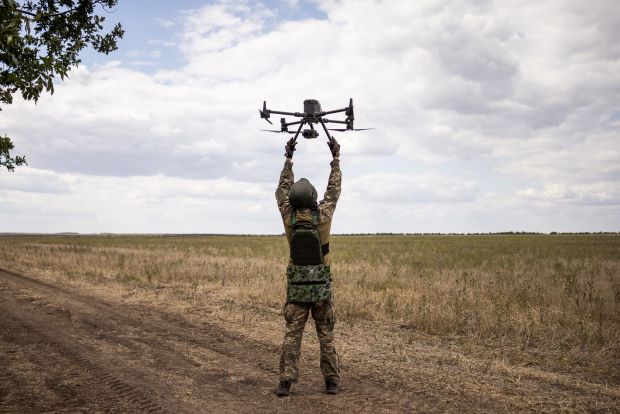Lauding their soldiers, Putin and Zelenskyy signal long fight ahead

By Marc Santora, Anton Troianovski and Michael Levenson
It was a moment that captured the intractability of a war that began nearly 10 months ago, featuring two antagonists presenting very different versions of the conflict.
President Volodymyr Zelenskyy of Ukraine, wearing a plain army-green jacket, on Tuesday (20) made perhaps his most dangerous trip to the front lines since the fighting began in February, travelling to the ravaged city of Bakhmut to hand out medals to soldiers as the thunder of artillery echoed in the distance.
At almost the same time, President Vladimir Putin of Russia summoned pro-war figures and propaganda leaders to an ornate hall in the Kremlin, where he honoured them for their commitment to the invasion of Ukraine.
Zelenskyy was expected to make another daring trip Wednesday (21) — this time to meet with President Joe Biden at the White House and address Congress in person, according to officials familiar with the planning. The plans were not final, and the risks involved — with the Ukrainian leader making his first known trip outside his country since Russia invaded — are high.
Putin’s televised event Tuesday, meanwhile, appeared aimed at showing his audience — both at home and abroad — that he was determined to continue the fight despite what US officials say are Russian casualties now exceeding 100,000 dead and wounded.
Zelenskyy’s visit to Bakhmut, whether by design or otherwise, stole some of the attention from Putin by showcasing the Ukrainian leader’s defiance and tolerance for personal risk in a city so devastated by repeated Russian assaults that it evokes images of the wastelands of World War I.
Ukraine’s success at retaining control of the city in the eastern Donbas region has lent it a symbolism that outstrips its military significance. ‘Bakhmut Holds’, read bumper stickers, artwork and T-shirts that can be found across Ukraine.
“The east is holding out because Bakhmut is fighting,” Zelenskyy said as he presented medals to Ukrainian soldiers and posed for photos. “This is the fortress of our morale. In fierce battles and at the cost of many lives, freedom is being defended here for all of us.”
Putin, too, appeared to be steeling his citizens for a difficult fight ahead.
He honoured the Russia-installed leaders of four Ukrainian regions that Moscow illegally annexed in September, though parts of the areas remain under Ukrainian control. And he recognized Semyon Pegov, a widely read Russian war blogger who was injured in Ukraine, and Margarita Simonyan, the hard-line editor of the RT television network, one of the Kremlin’s most important propaganda outlets.
“Thank you for wresting our people out of the bloody mouths of these man-eaters, despite the pain and the blood,” Simonyan said, in an apparent reference to the Kremlin’s false claim that Ukraine has been perpetrating a genocide against Russian speakers. “And we will help you whack these man-eaters as much as you demand it from us.”
It was a reminder that Moscow’s powerful propaganda apparatus, like Putin himself, has increasingly begun to acknowledge Russian struggles at the front, even if it still masks the extent of the losses. At the same time, Russian propaganda is presenting the war as existential — claiming that the true enemy is a NATO that seeks Russia’s destruction — and trying to brace Russians for further sacrifice.
Putin, in a brief speech at the end of the ceremony, said these were “difficult, unusual times” and praised Russian soldiers as “heroes.”
“When a country or even every person develops, moves forward, it always overcomes certain difficulties on this path,” Putin said. “But today, it’s indeed being accompanied by particular challenges.”
Hours earlier, Putin released a video message addressed to the employees of Russia’s security agencies in which he warned that the situation in Russian-held parts of Ukraine was “extremely difficult.”
In response, Putin suggested he would crack down harder. In a transcript of the video address released by the Kremlin, the Russian leader called on his security agencies to intensify their efforts “to put a firm stop to the activities of foreign special services and to promptly identify traitors, spies and diversionists.”
Putin has been projecting an image in recent days of a leader more directly involved in the invasion.
On Friday, he made an unannounced visit to a military command post coordinating the fight, the Kremlin said, without disclosing the location. And Monday (19), he made a rare visit to Belarus to strengthen military and economic bonds with the country’s authoritarian president, a close ally who has allowed the Russian military to use his territory as a staging ground for the war.
In Ukraine, concern has been intensifying that Russia may be planning a new offensive that could include a second attempt to seize Kyiv, the capital. Russia is planning the assault, Ukrainian officials say, even as it continues to attack Ukraine’s power plants and other important infrastructure in an effort to deprive the country of heat and light in the winter.
Energy officials say the attacks have left Kyiv with enough power for only about 20% of the city’s 3.3 million residents, forcing utilities to institute longer and more unpredictable outages to keep the grid stable.
Some analysts have said it would be difficult for Russia to launch a larger offensive, since its forces have been worn down from 10 months of fighting and the recent battlefield successes of the Ukrainian military.
A senior State Department official said Tuesday that top Russian officials were torn about whether to undertake a new offensive, with Moscow’s military leaders engaged in an internal debate over escalation.
-New York Times


Comments are closed, but trackbacks and pingbacks are open.